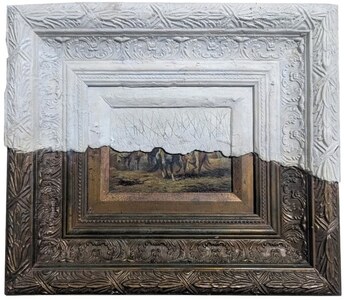
Babar is a cashier at a local bank. Yet when he needed some extra money to get his daughter admitted in a prestigious school, he could not take out a loan. With five dependants — his ageing parents, younger brother, wife and daughter — he was simply not considered a good candidate.
When the bank failed him, Babar’s wife came to the rescue. She told him that she had been saving money by contributing to ‘committees’. “Since then, I tell my wife to keep contributing to committees,” he says.
Similarly, Manzooran, who is a maid at a senior banker’s house, knows she cannot access the banking system. Like Babar’s wife, she also regularly contributes to committees. With her savings, she was able to get items for her daughter’s wedding. “When it was my turn to get the money, I was able to buy essentials such as a bedspreads, kitchen utensils and clothes,” she says.
Manzooran could contribute only modest sums to the committee at a time. “My husband does not have a steady job and my salary is not enough, so it is difficult for us to manage big committee amounts,” she tells Eos. She uses whatever little she saves to contribute to a committee run by a local doctor. Manzooran, and many residents of her neighbourhood in Karachi’s Korangi area, trust the doctor with their money. In most situations, trust and someone’s word would be considered a flimsy basis for a monetary exchange, but committees run primarily on goodwill, and are one of the most popular informal financing methods in Pakistan — especially for those who cannot easily access the formal financial sector.
As the banking system remains inaccessible for lower classes, particularly poor women, informal savings and pooling mechanisms are a comparatively reliable option for fulfilling debt needs and investment aspirations
A QUESTION OF TRUST
People in Manzooran’s neighbourhood rely on the doctor’s committee much more than one run by a housewife. They have good reason to be suspicious of her committee. After all, she once nearly ruined a wedding. A resident had been saving up for her son’s wedding by pooling money for the committee. She was planning to pay for the wedding hall with the eventual pay-off. But the payment got delayed, causing a panic in the family.
Indeed, for some, committees act as a savings fund and so it is imperative that the person managing the cash is reliable.
Salma, a cleaner at a local school, has been saving to support her husband’s shop for some years. The husband, who worked as a gardener in a government servant’s house, lost a limb in an accident. He was laid off work and had to set up a shop to compensate for the family income.
“Our elderly relative is considered a reliable and honest woman who handles committees,” she says. “Once the turns are decided…she sees to it that the member gets his or her committee by the tenth day of each month. Not a day more or less,” Salma explains.
She also believes that the woman is reliable because she runs a successful business and does not have cause to cheat people. Similarly, Manzooran trusts the doctor. “He is well-off, owns three houses and so is not greedy for money.”
Perhaps these women also have no choice but to trust the informal committee system.
According to Bringing Finance to Pakistan’s Poor, a study by Anjum Ahmed, Tatiana Nenova and Cecile Thioro Niang, only 14 percent of Pakistanis are using a financial product or service of a formal financial institution. In contrast, 32 percent people in Bangladesh, 48 percent in India and 59 percent in Sri Lanka have access to formal financial systems.
The study further notes that almost 50 percent of people in Pakistan have access to informal finance, which is in the form of “committees, shopkeepers, moneylenders or hawala/hundi money transfers and so forth.” The study states that of those who do not have access to formal or informal financial system, almost 19 percent keep away from it either due to a lack of awareness or because of illiteracy, poverty or religious reasons — such as religious restrictions on interest.
MORE MONEY, MORE PROBLEMS
While many turn to committees to meet their needs, committees are not only for those trying to make ends meet. The upper classes turn to committees not only for financial support but to derive fun. Janet loves the ‘kitty party’ attached to the idea of committees. “Though I can afford a lot of stuff because my husband is a businessman, the members arrange such interesting get-togethers, dinners and lunches, even movie plans, that I get lured into committees,” she says.
‘Aunty committees’, as they are sometimes called, have a certain reputation. In 2015, a woman from Rawalpindi allegedly designed a banking system. She approached ‘high-class’ ladies to set up a committee group worth four million rupees. According to media reports, the 18-month committee was spread among a hundred women who contributed around 30,000 rupees each.
Apparently, the woman entered Islamabad’s social scene claiming to own a house and two guest houses in sectors F-6 and F-8. She would hold ‘kitty parties’ and even invite celebrities to the gatherings. Soon enough, the members began to realise that they weren’t receiving their monthly contributions. They all reached her house only to find that she had absconded with the money.
But such incidents hardly seem to deter people from contributing to committees.
HALF THE POPULATION
Babar’s wife, Manzooran, Salma, Janet and the women who were conned in Rawalpindi all have two things in common. The first, of course, is that they contributed to committees. The second is their gender. Bringing Finance to Pakistan’s Poor found that gender can also be a factor in the decision to turn to committees.
“Given the banks’ criteria for lending credit only to those (men and women) who are either salaried or have business incomes, many women, including those who may have a secure source of rent income, are precluded from the banks’ financing including credit cards,” states the study. The study also points out that being less experienced banking clients than men, many women settle for committees that involve no paperwork and from which they can receive timely payouts for their needs.
As financial inclusion remains a difficult phenomenon for the majority, committees are a comparatively more reliable source for savings, that too for all classes. Despite the periodic cases reported for breach of trust in committee dealings, costing people their dear savings, most still have faith in committees.
As researchers of the study conclude, with the gap in the popularity of the informal finance sector and the “heavy procedure-driven formal sector”, the latter could learn a thing of two from the former.
Published in Dawn, EOS, November 17th, 2019


































